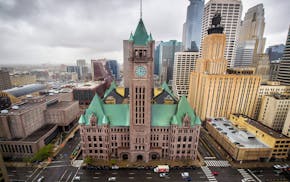Moments after the fat, $1.9 billion state budget surplus forecast rolled out Feb. 27, I'm pretty sure I saw the window of political opportunity closing on DFL Gov. Mark Dayton's plan to raise more transportation taxes.
The thinly disguised glee in the voices of Republican legislative leaders told me they saw it, too.
"This surplus means that Democrats can stop talking about a gas tax increase in St. Paul," House Speaker Kurt Daudt said that day. To do otherwise would be "unconscionable," Sen. Michelle Benson, R-Ham Lake, chimed in. Voters won't believe the state needs to raise any tax when this much surplus cash is sloshing about, they said.
They may be right. But if Republicans win this year's gas tax argument, a big challenge will come right back at them: If not with a gas tax increase, how will you pay to make Minnesota roads and transit better meet demand?
Whatever you choose, make it predictable, reliable and sustainable, pleads Don Hall. Now-and-then money from an occasional general fund surplus like the one Minnesota has now won't do the job nearly as well.
Hall is vice president of Hardrives Inc., a family-owned business in Rogers that has been building roads in the Upper Midwest since 1963. He heads the transportation lobbying committee of the Associated General Contractors (AGC) in Minnesota.
A chat with a roadbuilder might be useful for legislators about now. Hall reminded me of the sound, practical reasons behind Minnesota voters' decision 91 years ago to constitutionally dedicate the gas tax for roads. Roadbuilding needs the assurance that money will be available not just next year, but next decade.
"Any funding is good," Hall said, noting that for many years Minnesota has been spending too little to stay ahead of road and bridge deterioration. "But sustainable money is what we really need. It allows us to plan and organize. We can plan for our labor needs, take the time to train and retain our employees and plan our equipment purchases. We can maintain material inventories that aren't just-in-time.
"All of that creates more efficiencies. And that helps the taxpayer. If a contractor can plan and organize, there's an opportunity for more competitive bidding."
Minnesotans have long heard that if they squeeze transportation funding today, they'll pay more tomorrow because of the inexorable march of inflation and infrastructure decay.
That's just part of the story. They'll also pay more than necessary if the state tries to ease the squeeze with a one-time shot of money from, say, a $1.9 billion general fund surplus.
Tim Worke, director of AGC's highway and transportation division, explained: "Will the taxpayer get a contractor's sharpest, best bid if it's a one-time bite? Is the contractor going to make the big investment decision to buy hugely expensive capital equipment, say a million-dollar scraper or paving machine, for the opportunity to bid one project in one year?"
Hiring is more expensive, too, if future funding is uncertain, Worke said. It takes higher pay to lure highly skilled workers here for intermittent projects.
The run-up to construction also requires dependable funding, said Tracy Hatch, chief financial officer for the Minnesota Department of Transportation (MnDOT). Acquiring land, conducting environmental study, meeting federal requirements and preparing engineering designs typically takes four years on a routine project and a decade or more on a big one.
During that process, "the ability to be certain that those dollars will be there in future years is really important," Hatch said. Interrupt the planning process because money has dried up — or was raided to plug a hole in the general fund, as happened as recently as 2003 — and chances are good that the initial work will have been for naught, she said.
The business community has been calling for greater efficiency in state transportation spending as an alternative to higher taxes. But the state Chamber of Commerce is also calling for using general fund moneys for transportation, as 33 other states do.
A lot of the transportation planners in those 33 other states envy Minnesota's dedicated tax stream, MnDOT Commissioner Charlie Zelle said last week. Minnesota's gas tax was dedicated to roads and bridges in 1924 and shared with cities and counties in 1956; its motor vehicle sales tax was dedicated by the voters in 2006.
Since the surplus in the state's general fund swelled, crafty Republicans and at least one DFLer, transportation-battle-scarred Rep. Ron Erhardt, have been eyeing ways to transfer general fund money to highway purposes in 2016-17 and beyond. Some of the ideas are pretty interesting. For example, using the general fund to pay for the State Patrol would put $186 million more into the trunk highway fund over the biennium. Directing sales taxes generated by auto repairs to highway purposes would shift $385 million.
The problem is that the 2015 Legislature can only make such moves for 2016-17. It lacks the authority for "beyond." And in transportation funding, perhaps more than any other state-funded activity, "beyond" matters. Minnesotans will know that the no-new-gas-tax crowd is getting serious about a transportation solution when it proposes a constitutional amendment to dedicate some other tax to that purpose.
Lori Sturdevant is a Star Tribune editorial writer and columnist. She is at lsturdevant@startribune.com.

As a topic among policymakers, housing is hotter than it once was
Worries about the U faded in search for new president

Up next for the DFL: amending the state Constitution
To combat contempt of courts, there's no substitute for character


